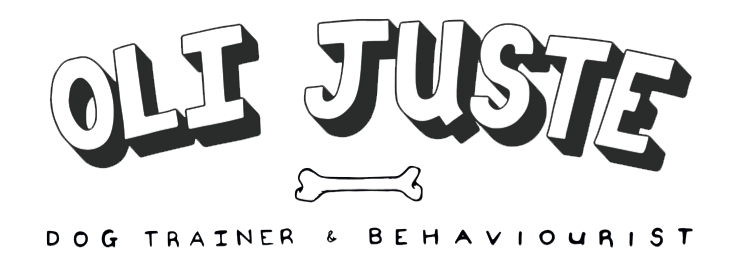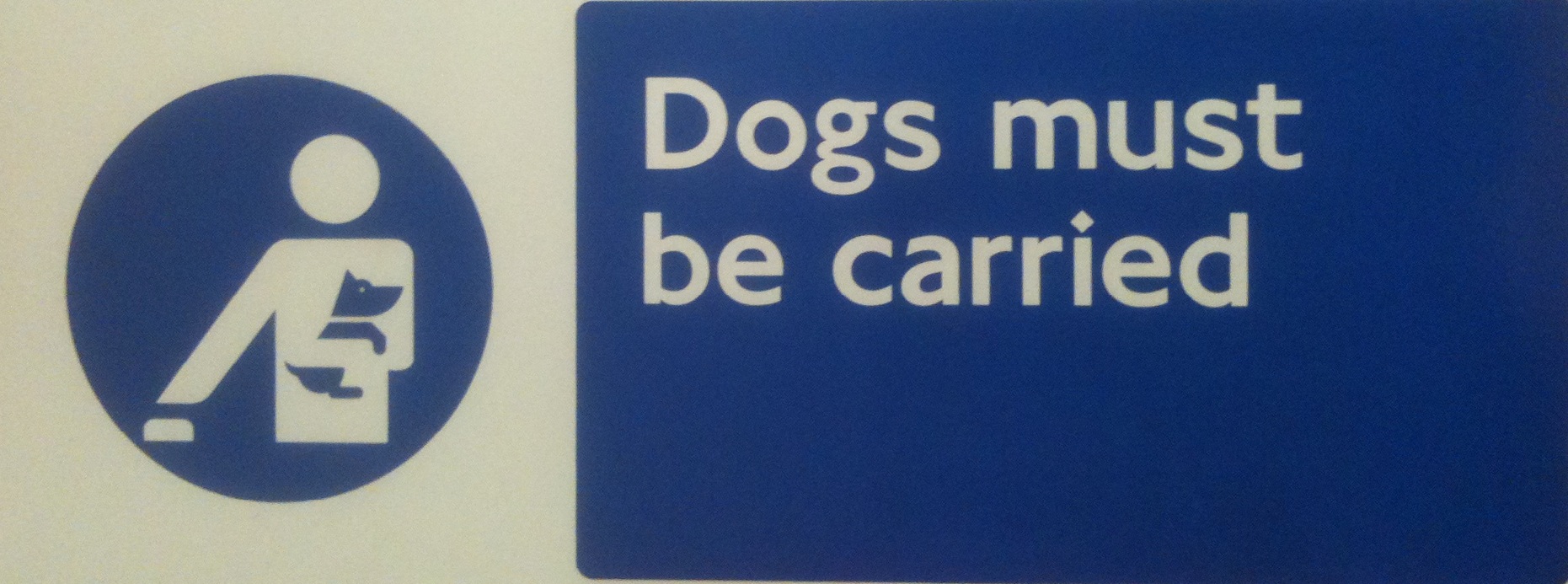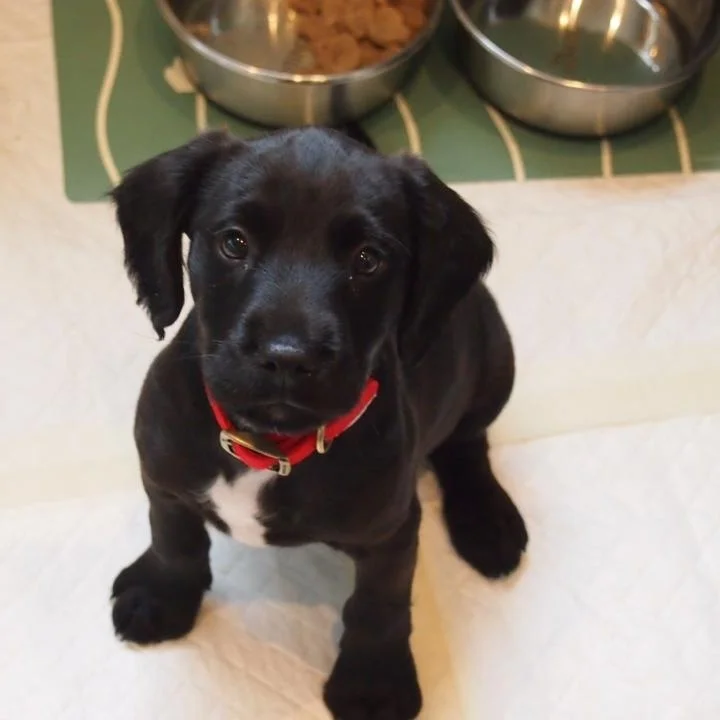I was going to call this Blog; The Challenges Of Training Urban Puppies. Then I realised it should simply be called; Training Urban Puppies, because I think calling it a challenge is unfair. Young dogs, like us, are brilliant at adapting to their environment- we just have to support them along the way. We can use smart training techniques, a lot of love, and understanding to help our dogs feel happy and confident in many different city environments & situations.
Making a list of things your pup is likely to be “confronted with ” whilst living in the city is a great tool to help you focus and plan. However, as your urban life with your canine evolves, it’s important that you continue to evolve your training too. Making a second list of all the things you didn’t think of in the first place will become vital. And that’s because cities and towns, big or small, will always surprise you and you’ll realise too late that you forgot to socialise your puppy to large bottomless lifts at the new trendy shopping centre or Hen Parties on Public Transport, or accustom them to Kids on Scooters and other potentially distressing situations. Of course, what distresses one dog may not distress another- just as with humans; many take a hen party in their stride!
Introducing your puppy to as many of your routines as possible early in his life (the major part of socialisation should be done by his 15th week) is imperative. Especially if they include taking public transport, being left alone for a while, visiting friends, pubs, bars, cafes, work events, taking Black Cabs, the list goes on. Once you’ve introduced these routines, your dog can preempt what will happen next in the day, and gear up for it. This will help him stay strong and positive. If these routines are not introduced in a positive way to start with, repetition will not alleviate any negative behaviours so it’s worthwhile trying to get it right from the start. Getting the dog cognitively engaged through training during the discovering stage is so important- it also makes it more fun and interesting for us.
There is a misconception that you have to live in the countryside or have a garden to be a suitable dog guardian. Hogwash! We have beautiful parks and green spaces. Sure, we don’t have rolling countryside, but we can get creative to use what we have and make the best of it.
Scent games for example are a wonderful way to train our dogs, positively engage with them, and keep their brains and body on the move. Your dog will be exhausted after a session. You can enrol in courses early. On a rainy day, when the streets of the city are wet and gloomy and the parks too muddy, a good scent game session at home can totally replace your second walk of the day. I should be clear here; it should not come instead of your main daily walk, and some breeds or individuals might still need their two walks a day (or more).
One thing that I love about dog ownership in the city is that it often creates a wonderful community. More and more on the news we hear about loneliness. Having a dog is a wonderful way to meet people and, of course, other dogs (which is another important part of socialisation). But we should remember two things.
It’s not because you have a dog that people will be nice to you; sometimes quite the opposite in fact (also, if you don’t clean up after your dog you might infuriate the neighbourhood. Be warned).
Yes, walking a dog is a wonderful way to meet the locals but you should remember your dog always comes first. Here are a few useful city park etiquettes:
Socialisation does not mean your your puppy must play with every dogs on the planet. Walking in large park without stoping to say hi to everyone along the way will be a very good introduction to how you would like him to behave in a few years. If it's not acceptable for a two year old human to do it, don't let your puppy rehearse the behaviour.
If you chose to go in a dog area, and if it is already in use, kindly ask if you can come in and if the dog(s) there are friendly.
Bring a ball/ toy (even if your puppy doesn’t yet play at home with one). This can help if your dog suddenly decides to play with the other dogs’ toys, or needs a distraction. Always ask the other owners before introducing your ball to the equation if it is Ok to do so. Some dogs can become possessive over balls. So always double check.
Watch the greetings, make sure it is friendly, maybe introduce them to one dog at a time.
Watch your dog not your phone.
Pick up your dog’s poo.
Play fighting can be cute but don’t let it last for too long. A few minutes, then go. Keep it short.
You don’t have to stay long, especially if your dog is telling you he wants to go. How do you know he wants to go? He might start jumping up at you, staying in between your legs, waiting by the gate. Always trust your dog’s instinct. He might know something you don’t. He might have spotted (through scent probably) a nervous and unpredictable dog in the enclosure. So even if the other human in the enclosure is cute, go…
You can train your dog there too. It’s a great environment for learning, especially recall.
Dogs are happy when they can be with and communicate with their humans. So as long as you have the right breed for you, time to train your dog, engage with your dog and respond to his needs, you and your dog will have a swell time regardless of where you live or how urban your environment is.
When it comes to training your dog for life in the city, training techniques remain the same, but where training takes place should vary just as your life in the city varies. As I touched on earlier, the training environment should change often and represent an array of likely situations the dog will have to experience in the future. Training on the street, in the park, on the tube, by the school, at a trendy coffee shop etc. you get the idea. Think smells, hustle and bustle, noises, textures, and different people. It’s a long list but all these factors contribute to the urban life of your dog and what he will need to become comfortable with.
It’s also a wonderful way to discover or rediscover your city. Don’t stick to the same dog walks day in day out. Explore, investigate, look for dog friendly venues and dog friendly events online. So put your comfy shoes on, pick up your lead and the dog, obviously, put a smile on your face and go socialise! Walk, take the bus, the tram, the metro/tube, these are great places to socialise your dogs.
Now, I must admit, a few things can become a little tricky. For instance; toilet training a puppy in the city can be a little challenging. If it takes you 5 long minutes to get out of your block of flats, through a long corridor, a lift, and a couple of entrances to get your puppy to a suitable place for him to relieve himself- you’d better plan ahead, and try not to get caught short of time. When your dog gotta go, he’s gotta go!
Also- waving to your neighbours in your pyjamas and fluffy mules whilst your dog takes a pee is not for everyone. Remember to think ahead if you want to avoid this!
Certain breeds will find it harder in the city than others, but then it is also our duty as Dog Trainers to make a conscious effort to be available early to advise potential clients on what breed is the best fit for them. If you are thinking of adopting a dog, then some might find city life impossible. It all depends on the environment they were in as puppies, and how comfortable they are with change.
One of the things I love the most about my job is the diversity. In one day I could be training a French bulldog, a springer spaniel and a Great Dane. This is proof that a wide variety of dogs can be very happy and fulfilled living in the city- Yes! Even Great Danes! Although, it has to be said that these wonderful giants prefer a black cab to a struggling owner attempting to carry them up the escalators at Leicester Square tube!
I feel so privileged to train and spend time with dogs of all ages, sizes and temperaments, as well as with their wonderful humans. As I mentioned earlier, I think the success of dog ownership in the city is largely based on choosing the right dog for you, and making sure that the humans and the dogs are set up for success prior to the dog's arrival, whether it be a puppy or a rescue. It's important to have someone who can give you sound, safe and friendly advice to help you ease into dog ownership, even if you’ve had a dog before.
If you're in London and need help or advice please:
Or if you are out of London you can check to see if you have a Clever Dog Company Method or an APDT trainer in your area
The Odin Dog Toy
£21.50
Yup! You Stink Wipes
£2.95
Cotton Tug Dog Rope
From £15.00
Ecohound Poo Bags
240 Bags - £10.50
























We have been rather busy during lockdown with our friends over at @ButternutBox creating some fun videos to help you during this strange time. If you haven’t already seen them, you can find them on my IGTV over on my Instagram profile and also on theirs….